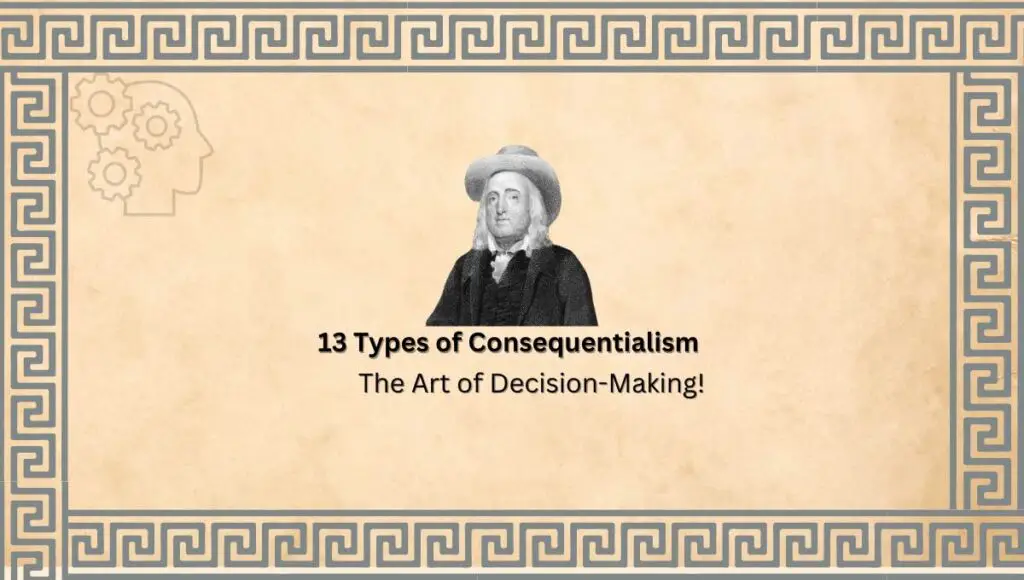Types of Consequentialism: 13 Powerful Ways to Decide!
Consequentialism is like judging a book by its cover but in a good way. It’s all about the outcomes, not the intentions. If you’re wondering why this matters today, think about decisions on climate change, justice, and personal choices. Consequentialism helps us navigate these tricky waters.
Consequentialism is an ethical theory. It states that the rightness or wrongness of actions depends on their outcomes. In simpler terms, the ends justify the means. If the result of an action is good, the action itself is considered good. It’s all about what happens in the end.
In this blog, we’ll dive into the different types of consequentialism. We’ll explore how each type offers a unique lens to view moral decisions. Whether you’re new to philosophy or a seasoned thinker, there’s something here for you.
Historical Background:
Origins
Consequentialism has roots in ancient philosophy, but it really took off in the 18th and 19th centuries. Jeremy Bentham and John Stuart Mill are the big names here. Bentham introduced the idea of utilitarianism, focusing on the greatest happiness for the greatest number. Mill refined this, making it more about the quality of happiness, not just quantity.
Development
Over the years, consequentialist thought has evolved. Philosophers have debated and refined its principles, leading to various branches. Each type of consequentialism offers a different take on how we should evaluate the consequences of our actions.
Core Principles of Consequentialism:
Basic Tenets
The main idea of consequentialism is simple: actions are judged by their outcomes. If an action leads to good consequences, it’s the right thing to do. If it leads to bad consequences, it’s wrong. This is the heart of consequentialism.
Contrast with Other Theories
Consequentialism isn’t the only game in town. Deontology, for example, focuses on duties and rules. Virtue ethics, on the other hand, emphasizes character and virtues. Unlike these theories, consequentialism looks strictly at the results of actions. It asks, “What will happen if we do this?” rather than “What rules should we follow?” or “What kind of person should we be?”
13 Types of Consequentialism:
1. Utilitarianism
Definition:
Utilitarianism is centered around the principle of the greatest happiness. It argues that the best action is the one that maximizes happiness for the greatest number of people.
Variants:
- Act Utilitarianism: This variant assesses each action on its own. An action is considered right if it produces the greatest amount of happiness compared to other possible actions. For example, if you can help a friend move or study for an exam, act utilitarianism would have you choose the action that leads to the most overall happiness.
- Rule Utilitarianism: Instead of evaluating individual actions, rule utilitarianism focuses on following rules that generally lead to the greatest happiness. If a rule, such as “always tell the truth,” typically results in more happiness, then it should be followed even if, in some specific cases, it doesn’t lead to the best outcome.
Key Thinkers:
Jeremy Bentham introduced utilitarianism with a focus on the quantity of happiness. John Stuart Mill refined this idea by emphasizing the quality of happiness, arguing that intellectual and moral pleasures are superior to physical ones.
2. Ethical Egoism
Definition:
Ethical egoism posits that the morally right action is the one that advances one’s own self-interest. It’s like putting on your oxygen mask first before helping others in an emergency.
Criticism and Support:
Supporters claim it promotes individual responsibility and self-care. Critics argue it can lead to selfish behavior and neglect of others’ needs. For instance, if everyone acts in their own interest, societal cooperation might break down, leading to worse outcomes for everyone.
3. Altruism
Definition:
Altruism is the ethical stance that prioritizes others’ welfare, sometimes even at a personal cost. It’s the idea of putting others before yourself, like donating to charity, even if it means you have less to spend.
Examples:
Historical examples include figures like Mahatma Gandhi, who sacrificed personal comfort for the greater good. Everyday examples include volunteering at a homeless shelter or helping a stranger in need.
4. Preference Utilitarianism
Definition:
Preference utilitarianism evaluates actions based on how well they satisfy the preferences of those affected. It’s about fulfilling desires and needs, not just maximizing happiness.
Proponents:
Peter Singer and R.M. Hare advocate for preference utilitarianism. They argue that respecting individual preferences leads to better overall outcomes. For example, giving a vegetarian a salad instead of a steak aligns with their preference and leads to a better outcome for them.
5. Negative Consequentialism
Definition:
Negative consequentialism focuses on minimizing harm rather than maximizing good. It suggests that preventing bad outcomes is more important than promoting good ones.
Applications:
Policies aimed at reducing suffering, like healthcare improvements or poverty alleviation programs, exemplify negative consequentialism. For instance, prioritizing vaccinations to prevent disease spread minimizes harm and suffering on a large scale.
6. Rule Consequentialism
Definition:
Rule consequentialism evaluates the morality of actions based on rules that lead to the best outcomes. It’s about finding general principles that usually produce good results and adhering to them.
Comparison:
Act utilitarianism looks at each action’s specific outcomes, while rule consequentialism considers the broader impact of following certain rules. For example, a rule like “don’t lie” is generally beneficial even if, in some cases, telling a lie might produce a better immediate result.
7. Motive Consequentialism
Definition:
Motive consequentialism evaluates the morality of an action based on the agent’s motives and the consequences of acting on those motives. It considers why someone did something and what results their motives produce.
Examples:
Imagine a doctor who performs surgery to save a patient’s life because they genuinely care about the patient’s well-being. If the surgery is successful, both the motive (caring for the patient) and the outcome (saving a life) are good. On the other hand, if a doctor performs surgery just for the money and it results in harm, the bad motive impacts the ethical evaluation of the action.
8. Two-Level Consequentialism
Definition:
Two-level consequentialism uses two kinds of moral thinking. In everyday situations, we rely on intuitive moral thinking, like common sense rules. For complex cases, we switch to critical moral thinking, carefully analyzing the consequences.
Key Thinkers:
R.M. Hare is a prominent figure in this area. He suggested we need simple rules for daily life but should be prepared to critically assess situations when they become complicated.
9. Rule Egoism
Definition:
Rule egoism states that the right action is the one that conforms to rules which lead to the best outcomes for oneself in the long run. It’s about playing the long game for personal benefit.
Criticism:
Critics argue that rule egoism can still lead to selfish behavior. It may not promote genuine cooperation or trust, as the ultimate goal is personal gain, not mutual benefit.
10. Scalar Consequentialism
Definition:
Scalar consequentialism suggests that actions are not simply right or wrong but fall on a scale based on the goodness of their outcomes. It’s about degrees of moral value.
Implications:
This perspective changes ethical decision-making by allowing for more nuanced judgments. Instead of asking if an action is right or wrong, we ask how good or bad it is compared to other options.
11. Objective vs. Subjective Consequentialism
Definitions:
- Objective Consequentialism: Evaluates actions based on actual outcomes. What really happens as a result of the action?
- Subjective Consequentialism: Evaluates actions based on expected outcomes. What did the agent reasonably expect to happen?
Comparison:
For example, if you donate to a charity that you believe helps people, subjective consequentialism says your action is good based on your intention. If the charity turns out to be fraudulent, objective consequentialism would say the action was bad because the actual outcome was negative.
12. Collective Consequentialism
Definition:
Collective consequentialism evaluates actions based on the outcomes for groups or societies. It focuses on what’s best for the collective, not just individuals.
Examples:
Public policies like universal healthcare or environmental regulations are judged based on their overall benefit to society. For instance, implementing clean energy initiatives benefits the entire community by reducing pollution and promoting health.
13. State Consequentialism
Definition:
State consequentialism, rooted in Chinese philosophy, evaluates actions based on their contribution to the welfare and stability of the state. It’s about what’s best for the country or society as a whole.
Historical Context:
This idea is particularly linked to Legalism in ancient China. Legalist thinkers like Han Feizi argued that the state’s stability and power were the ultimate goals.
Examples:
Historically, policies like the construction of the Great Wall of China were seen as actions to protect and strengthen the state. In modern times, policies promoting national security or economic stability can be viewed through the lens of state consequentialism.
By diving deeper into these types of consequentialism, we see the rich diversity within this ethical framework. Each type offers a unique approach to evaluating actions and their consequences, enriching our understanding of moral philosophy.
Ethical Dilemmas and Case Studies:
Real-World Examples
- The Trolley Problem (Utilitarianism vs. Rule Consequentialism): Imagine a runaway trolley heading toward five people tied to the tracks. You can pull a lever to divert it onto another track, where it will kill one person instead.
Utilitarianism would say pull the lever because it saves more lives, maximizing overall happiness. Rule consequentialism might argue against it because a general rule against actively causing harm, even to save others, leads to better overall outcomes.
- Self-Interest vs. Altruism in Business (Ethical Egoism vs. Altruism): A CEO must decide whether to cut costs by laying off employees or find an alternative that keeps everyone employed but reduces profits. Ethical egoism suggests laying off employees to maximize profits and personal gain. Altruism, however, would argue for keeping the employees, as it benefits the larger group, even if it means less profit for the CEO.
- Vaccination Policy (Negative Consequentialism): Consider a government deciding on mandatory vaccinations. Negative consequentialism would support mandatory vaccinations to minimize the harm and suffering caused by preventable diseases despite potential individual discomfort or opposition.
Analysis
Trolley Problem: Utilitarianism provides a clear decision-making process focused on outcomes. However, it can be criticized for justifying morally questionable actions, like sacrificing one life to save five. Rule consequentialism helps mitigate this by adhering to rules that generally prevent harm, but it can sometimes lead to less optimal outcomes in specific situations.
Business Decision: Ethical egoism prioritizes self-interest, which can drive innovation and success but may harm others in the process. Altruism focuses on the welfare of others, fostering goodwill and trust but potentially at a cost to personal or organizational success.
Vaccination Policy: Negative consequentialism prioritizes reducing suffering, making it a strong argument for public health policies. However, it can face resistance from those who value personal freedom over collective welfare.
Criticisms and Debates:
Main Criticisms
- Demandingness Objection: Consequentialism can be very demanding. It may require significant sacrifices from individuals for the greater good. For instance, utilitarianism might demand that you donate most of your income to help those in need, which is impractical for most people.
- Justice and Rights Concerns: Consequentialism sometimes overlooks individual rights and justice. Actions that produce good outcomes might still violate someone’s rights. For example, sacrificing one innocent person to save many others can seem unjust, even if it leads to a better overall outcome.
Responses
- Demandingness Objection: Consequentialists argue that moral theories should challenge us to do better. While the demands can be high, they promote a more ethical and caring society. Moreover, some consequentialist theories, like scalar consequentialism, allow for a more nuanced approach, recognizing degrees of moral goodness rather than a strict binary of right and wrong.
- Justice and Rights Concerns: Consequentialists can incorporate rules or principles that protect individual rights within their frameworks. Rule consequentialism, for example, supports rules that uphold justice and rights because these generally lead to better outcomes. Additionally, some forms of consequentialism, like motive consequentialism, consider the agent’s intentions and the broader context, addressing concerns about fairness and justice.
By examining these ethical dilemmas and criticisms, we see how consequentialist theories apply in real-world situations and the challenges they face. This deeper understanding helps us navigate complex moral landscapes with a more informed perspective.
Consequentialism in Contemporary Ethics:
Modern Applications
- Bioethics: Consequentialism plays a significant role in bioethics, particularly in medical decision-making. For example, utilitarian principles guide decisions about resource allocation, such as organ transplants. The goal is to save the most lives or improve the overall quality of life. In end-of-life care, negative consequentialism might be used to minimize suffering, leading to support for palliative care and hospice services.
- Environmental Ethics: In environmental ethics, consequentialism supports actions that benefit the environment and future generations. Policies aimed at reducing carbon emissions are judged by their long-term positive impacts on climate change. Preference utilitarianism might prioritize actions that fulfill the preferences of both current and future individuals, leading to sustainable practices and conservation efforts.
- Global Justice: Consequentialism influences global justice initiatives by promoting actions that reduce poverty and improve welfare worldwide. Programs like international aid and development projects are evaluated based on their outcomes. For instance, preference utilitarianism can guide efforts to address global health crises by focusing on interventions that fulfill the health needs and preferences of affected populations.
Future Directions
Consequentialist thought continues to evolve, incorporating new insights and addressing criticisms. Here are some future directions:
- Integrating Technology: As technology advances, consequentialism will play a crucial role in guiding ethical decisions in AI and robotics. Ensuring that technological developments lead to positive outcomes and minimize harm will be a central concern.
- Enhancing Global Cooperation: Consequentialist principles can help address global challenges like climate change, pandemics, and economic inequality. By focusing on collective well-being and long-term outcomes, consequentialism can promote international cooperation and effective global governance.
- Addressing Ethical Pluralism: Future consequentialist theories may integrate elements from other ethical frameworks to create more comprehensive approaches. For example, combining consequentialism with virtue ethics or deontology could address concerns about justice and individual rights while still focusing on outcomes.
Conclusion:
Consequentialism is a multifaceted ethical framework that judges actions based on their outcomes. There are various forms of it, each beneficial in particular situations.
It offers a powerful lens for evaluating ethical decisions based on their outcomes. From bioethics and environmental ethics to global justice, consequentialist principles guide us in making choices that aim for the greatest good.
As we face new challenges in technology and global cooperation, consequentialist thought will continue to evolve, integrating new insights and addressing criticisms to create more robust ethical frameworks. Understanding the various types of consequentialism enriches our moral perspective and equips us to navigate the complex ethical landscapes of our time.



